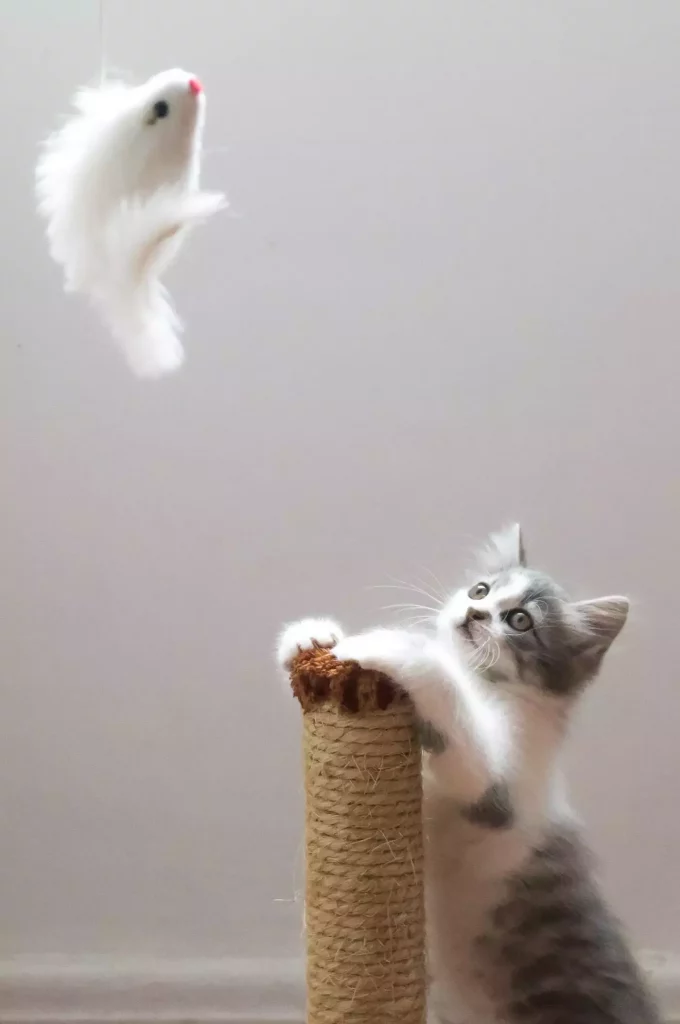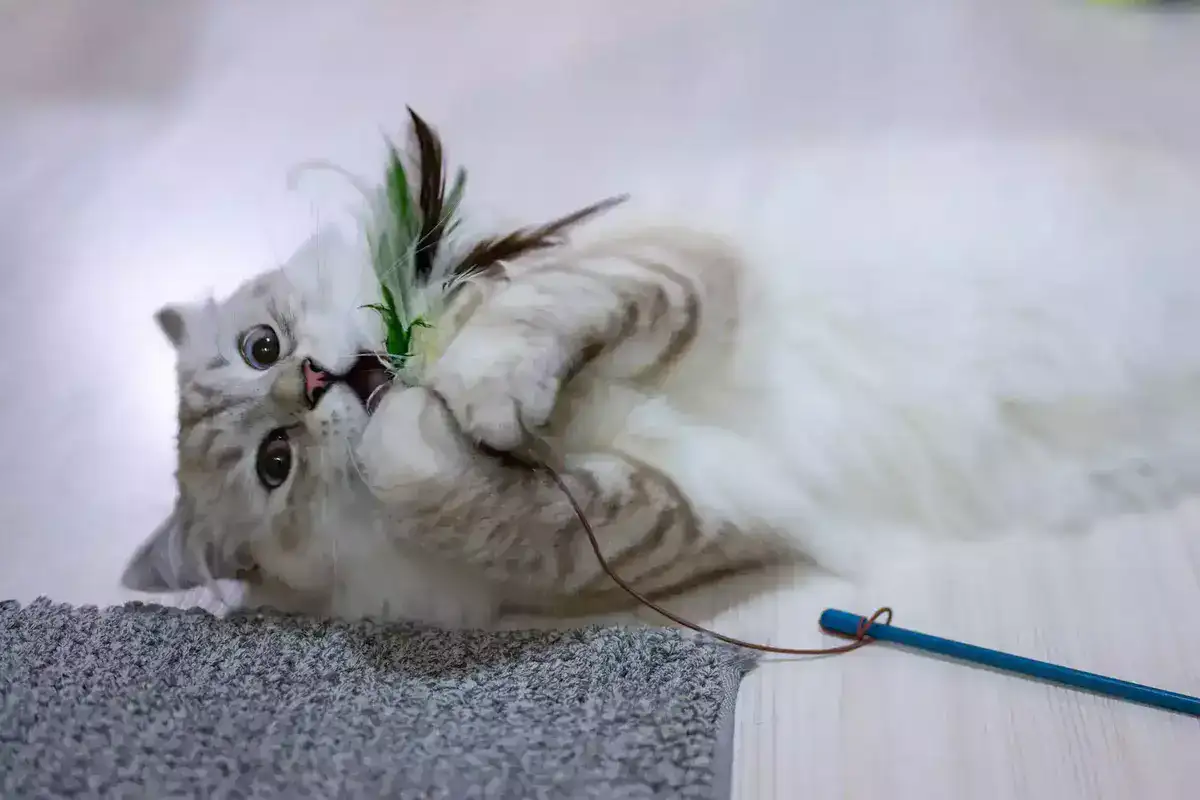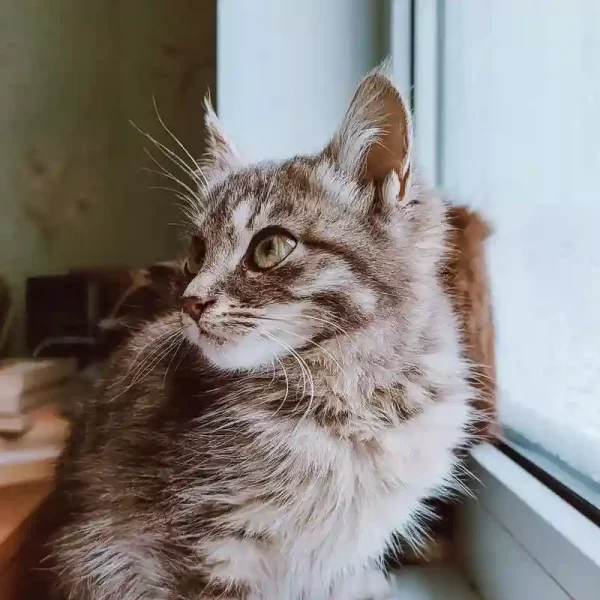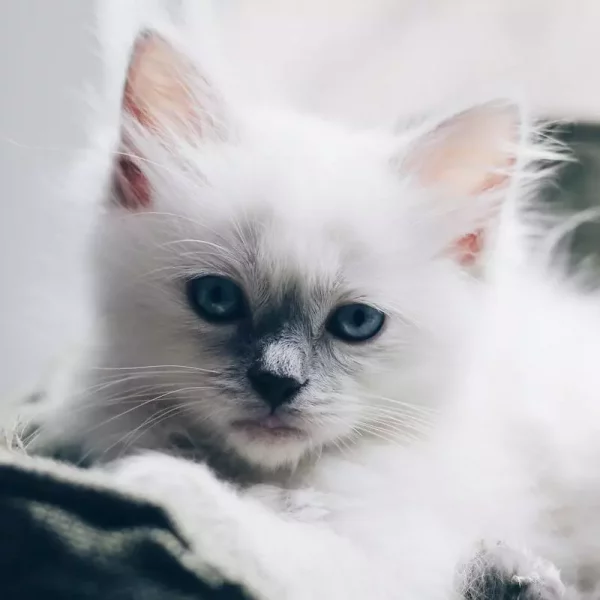All cats are different and whilst some take little to no interest in feathers, many are either fascinated, scared or excited to find a feather lying on the ground. Some cats will even like to eat feathers (including fake ones). Our own cat like feathers, but out friend’s kitten hates feathers… I decided to find out why.
Why cats like feathers? Cats like feathers as they are an unconventional plaything, especially for inquisitive cats. Cats may like the way feathers float and will like to chase them. I can also be because it smells like a bird, which taps into the natural instinct to hunt and chase.
But why do cats like feathers so much?
Regardless, some cats love feathers, some cats hate them, and some cats can take or leave them. But why does your cat like playing with feathers? Is it safe? And is there anything you can do about it?
As I mentioned, I wanted to find out why my cat likes to eat feathers so spoke to our vet and read some pet forums.
From what I can find, cats are naturally inquisitive creatures and many different things can be fascinating to them, including feathers. This can be because they either haven’t seen a feather before or they are very well acquainted with feathers and associate it with food, play or just general fun times.
While some cats don’t know what to do with them, resulting in many adorable ‘cat scared by feather’ videos online, while others enjoy chasing them around or chewing on them.
Whatever the reason is for your cat’s love of feathers, as long as you keep an eye on them and keep them away from the feather’s source (being a bird) then you shouldn’t have any issues with letting them play with it.
Why do feathers freak out cats?
And then you have cats who hate feathers and get completely freaked out by them. There’s even a name for this condition with cats who don’t like feathers; pteronophobia.
“Pteronophobia is the fear of feathers, feathered objects, or being tickled by feathers. The word Pteronophobia comes from Greek ftero which means feathers and phobos meaning fear or deep aversion.” (see source)
If your cat hates feathers, she may very well have pteronophobia. The reason this could happen is due to the unpredictable way in which feathers move. You can see a classic example of this in the video below.
Why do cats eat feathers?
Like many things, including grass and leaves, cats like to eat feathers and chew on many different things they find. Their sense of smell is heavily tied into taste and chewing on something is a way for them to get a full sense of smell from the item in question.
It could also relate to an evolutionary aspect. If the feather your cat finds smells of dead bird’s carcass, then the instinct to hunt and eat will kick in.
Is it bad for cats to eat bird feathers?
Depending on the size of the feather, unlike leaves which can often cause allergies, cats eating feathers is not usually an issue. Some cat owners will feed their kitty a raw diet, sometimes giving their cats un-plucked chickens to eat without any ill effects.
What happens if cats eat bird feathers?
Feathers and fur can actually be beneficial to a cats’ health, such as cleaning out the digestive system, flossing between their teeth and the natural fibers helping digestion.
That being said, larger feathers from birds such as geese or large fake costume feathers can sometimes cause issues for cats, with the shaft or stem of the feather splintering and becoming lodged in their throat.
Can cats digest feathers?
Cats cannot digest feathers. Most of the time your cat will either vomit the feathers up, or the feathers will naturally pass through the cat’s body, coming out in the faeces without a problem. Feathers should pass through the digestive system in 1 to 3 days, so check the cat’s stools.
However, there can be a risk that the feathers will get caught in your cat’s body. Sometimes your cat will be able to vomit the feathers back up.
Handy Hint: Cats are known to be very sneaky and intelligent in their own ways. Read my guide to learn how to stop your cat from stealing human food.
My cat ate a feather – what do I do?
If you have noticed that your cat has eaten a feather, then you shouldn’t be too concerned. While feathers can’t really be digested, they can easily pass through your cat’s digestive system without any real issue and can actually be beneficial.
Feathers have been found to clean out a digestive tract of any waste matter and even eggs and worms, the fibers of the feather helping collect it all up and sweep it out into your cat’s waste.

However, you should be worried about your cat eating a feather if they show signs of choking or discomfort in their throat. This can be a sign that part of the feather is trapped or lodged. Here are some signs to look out for:
- Check your cat’s faeces to see if the feather has passed through.
- Check for any loss of appetite, vomiting, drooling, or diarrhoea.
- Check for coughing or obvious signs of pain when drinking water.
Occasionally a cat will eat a feather and then try to vomit it back up. The feather can then become stuck in the retropharyngeal area which is the back of the throat.
This leads to irritation and can produce serious symptoms such as drooling, inability to swallow, sneezing, nasal discharge and possibly bloody discharge.
If you are worried about your cat having eaten a feather or are noticing your cat may be in trouble after eating it, please contact your vet for further assistance.
My cat vomited the feather up
If your cat did sick the feather back up, you can probably deal with the situation yourself if you don’t feel you need to go to a vet.
Most often, vets would recommend that you:
- Don’t feed your cat for 24 hours so their insides can recover.
- Only let your cat have water (but needs to be 4 hours after vomiting).
- You can also let them have a very diluted chicken broth.
- After 24 hours let your cat go back onto bland food.
- Vets recommend a food mix of 75% cooked white rice and 25% cooked chicken.
- After 2 days of bland food you can start to revert back to a normal diet.
If your cat is still vomiting 3 days after eating the feathers, or you see blood in their faeces, or an in obvious pain, consult with your vet.
If your cat ate a fake feather, follow the same guidelines laid out above.
How to stop my cat eating feathers
If you are a worried about your cat eating feathers, either because of a potential choking hazard or to avoid your cat from becoming tempted at chasing birds, you can train your cat to not eat feathers.
If you find your cat chewing on a feather, simply take it away from them and warn them with a stern ‘no’. Taking away something fun from a cat can make them feel defensive, so if your cat tries to get it back or acts possessive over it when you try and take it away, try and offer an equivalent exchange, such as a treat or toy to distract them.
Additionally, positive reinforcement is a great training method, rewarding them when they leave the feather where it is on the ground so that they learn that it is a good thing not to touch it.
What do I do if my cat ate a bird?
Cats may be omnivores, but they do have that carnivore instinct that can unfortunately come at the expense of birds and smaller animals. A lot of cats take great pleasure in chasing birds around, and sometimes slower, fledgling, old or injured birds might not be able to get away fast enough.
Other times, they may come across an already dead bird that they then eat, which can be another issue all in itself.
Handy Hint: Can cats improve your mental health? Learn 7 ways cats do that.
A bird that your cat caught isn’t as dangerous as a pre-deceased bird, and often your cat will not suffer any ill effects. However, some birds do carry bacteria such as salmonella in their intestinal tracts, and dead birds they find lying on the ground can also contain germs and harmful bacteria, meaning that your cat may become infected.
Luckily, salmonella is easily treated and is often solved through the cat’s own immune system. Cats have a resilient immune system meaning that most of this bacterium won’t cause more than a stomach upset, although more serious cases may need hospitalization and blood treatment.
If you think your cat may be suffering from salmonella or another illness, please contact your vet who will be able to offer diagnosis and treatment.
If your cat has eaten a bird and feathers it will typically take around 10 to 24 hours for them to fully digest and excrete the remains, although some objects may take longer.
If you are worried about your cat eating another bird, then training them to not chase birds is a good start. Keep yours on a short leash when out on walks and show positive reinforcement and rewards when they do not go after birds.
For further tips, be sure to do your own research and speak to your vet about other ways to stop them from eating dead animals off of the ground.
Conclusion
Whether it is a small downing feather dropped by a passing bird, a larger feather found on a walk, or perhaps a fake feather that is floating around your home, it could create a very different reaction in your cat.
Some cats like feathers. Some cats hate feathers. Some cats even like to eat feathers.
How your cat reacts to feathers will be down to the individual. But if they do end up eating them, please do exercise some caution and have the vet’s number on hand just in case you need it.



Leave a Comment